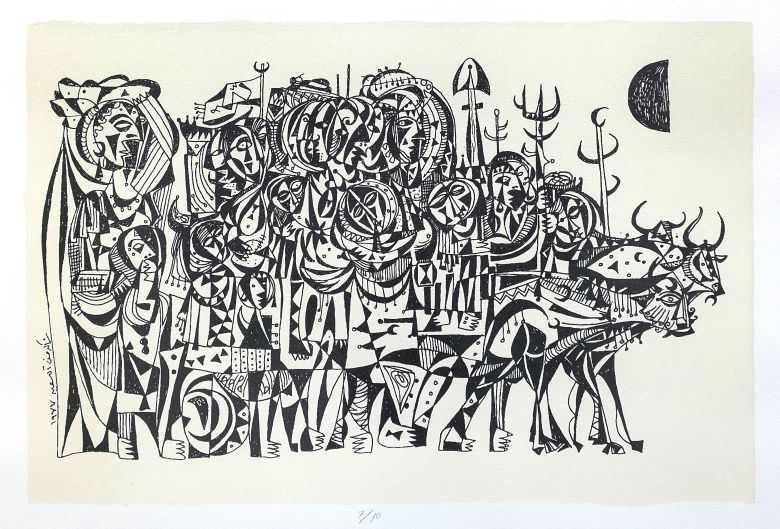Who's in town?
Amin Alsaden
Notes on Defining "Arab" Modernism
Salt Beyoğlu
February 8, 2024 18.30

Shakir Hassan Al-Said, Untitled, 1977
Courtesy of the Ibrahimi Collection
Courtesy of the Ibrahimi Collection
Walk-in Cinema
During his residency in Istanbul, Amin Alsaden is expanding his ongoing research into non-Western modernisms, specifically exploring overlaps between Arab and Turkish 20th century artistic and architectural cultures. He is also looking into the contemporary art scene, particularly the practices that seek alternative regional alignments, center worldviews resistant to colonial ideologies, and problematize inherited historical narratives.
In this Who’s in town? talk, Amin Alsaden will offer some speculative notes on the possibility of demarcating modernist art in the vast Arabic-speaking world, or the geography spanning from Southwest Asia to North Africa. He challenges existing definitions and underlines key themes that might characterize the unique artistic production of this region. The commonalities that he observed, based on his scholarship and curatorial practice, stem not only from specific contextual sociopolitical circumstances, but also from syntheses between the remarkable aesthetic heritage of these cultures with ideas and methods circulating globally during the mid-20th century. Going beyond the limitations of the Western canon, while also accounting for the obstacles inherent in studying art in a region mired in chronic turmoil, Alsaden raises questions about what research into non-Western modernisms entails and how that might shift understandings of contemporary artistic and exhibitionary practices.
The talk will be held in English and is open to everyone.
Amin Alsaden is a curator, educator, and scholar originally from Baghdad, Iraq, currently based in Toronto, Canada. His work focuses on transnational solidarities and exchanges across cultural boundaries. With a commitment to advancing social justice through the arts, Alsaden’s curatorial practice contributes to the dissemination of more diverse, inclusive, and global narratives by challenging hegemonic knowledge and power structures. He is interested in how artists and architects interrogate collective agency in the public realm and envision responses to some of the main issues confronting humanity today, such as organized violence, environmental degradation, and mass displacement. Alsaden’s research explores the history and theory of modern and contemporary art and architecture globally, with specific expertise in the Arab-Muslim world and its diasporas.
During his residency in Istanbul, Amin Alsaden is expanding his ongoing research into non-Western modernisms, specifically exploring overlaps between Arab and Turkish 20th century artistic and architectural cultures. He is also looking into the contemporary art scene, particularly the practices that seek alternative regional alignments, center worldviews resistant to colonial ideologies, and problematize inherited historical narratives.
In this Who’s in town? talk, Amin Alsaden will offer some speculative notes on the possibility of demarcating modernist art in the vast Arabic-speaking world, or the geography spanning from Southwest Asia to North Africa. He challenges existing definitions and underlines key themes that might characterize the unique artistic production of this region. The commonalities that he observed, based on his scholarship and curatorial practice, stem not only from specific contextual sociopolitical circumstances, but also from syntheses between the remarkable aesthetic heritage of these cultures with ideas and methods circulating globally during the mid-20th century. Going beyond the limitations of the Western canon, while also accounting for the obstacles inherent in studying art in a region mired in chronic turmoil, Alsaden raises questions about what research into non-Western modernisms entails and how that might shift understandings of contemporary artistic and exhibitionary practices.
The talk will be held in English and is open to everyone.
Amin Alsaden is a curator, educator, and scholar originally from Baghdad, Iraq, currently based in Toronto, Canada. His work focuses on transnational solidarities and exchanges across cultural boundaries. With a commitment to advancing social justice through the arts, Alsaden’s curatorial practice contributes to the dissemination of more diverse, inclusive, and global narratives by challenging hegemonic knowledge and power structures. He is interested in how artists and architects interrogate collective agency in the public realm and envision responses to some of the main issues confronting humanity today, such as organized violence, environmental degradation, and mass displacement. Alsaden’s research explores the history and theory of modern and contemporary art and architecture globally, with specific expertise in the Arab-Muslim world and its diasporas.

